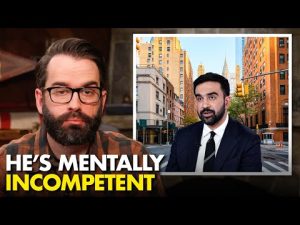The video clip making the rounds shows White House press secretary Karoline Leavitt cutting short a predictable gotcha question about why federal forces — including the National Guard — remain in Washington, D.C., after the administration moved to restore order on the streets. She answered plainly, refused to be lectured by a hostile reporter, and reminded the press that the priority is protecting everyday citizens, not protecting narratives. That bluntness is exactly what the country needs from its messenger when so many in legacy media are more interested in outrage than outcomes.
President Trump’s decision to federalize law enforcement in the capital and surge hundreds of officers and National Guard personnel was portrayed by the White House as a necessary response to real crime problems, and Leavitt repeatedly noted early arrests and weapons seizures as evidence the operation is working. The administration reports hundreds of personnel surged into neighborhoods, producing dozens of arrests for violent and narcotics offenses — and the message from the podium was unambiguous: this is only the beginning of a nationwide approach to restoring public safety. For anyone who values the rule of law, seeing federal resources used to protect Americans rather than to bow to political theater is a welcome change.
Democrat mayors and blue-city elites have predictably howled, casting the move as overreach while ignoring decades of soft-on-crime policies that hollowed out their neighborhoods. Washington’s mayor initially cooperated but then pivoted to outrage once political optics took precedence, proving the point conservatives have been making for years: leadership matters, and excuses cost lives. The press corps’ collective gasp when Leavitt shoved back was less about legal nuance and more about seeing the scripted advantage slip through their fingers.
Leavitt went further, delivering a message to Americans living under failed local leadership: decline is a choice, and residents do not have to accept being robbed or terrorized. That moral clarity — that citizens deserve to be safe and that federal help should be an option when local officials fail — is the polar opposite of the permissive, bureaucratic responses we’ve been fed for years. Conservatives who have been labeled alarmists for urging a return to law and order finally have confirmation that bold action can and does make streets safer.
The critics cry “martial law” while ignoring that federal intervention is often the only way to break cycles of violence when local systems are broken or beholden to soft-on-crime politics. There are legitimate legal debates about scope and limits, but the immediate moral question is simple: who stands with the victims? Watching a press secretary calmly rebuke a performative question and refocus the room on victims and results is refreshing — and a reminder that leadership requires guts, not excuses.
If conservatives want to win the argument for good governance, we must stop apologizing for insisting on safety, decency, and accountability. The D.C. operation is already being held up as a model for other cities considering federal assistance — and communities from Memphis to Los Angeles are watching closely as crime-fighting resources are deployed where local leaders failed to act. The choice facing Americans is plain: continue to tolerate decline and political theater, or back leaders who will actually defend neighborhoods and families — the White House has made its choice, and patriots should proudly stand with it.







